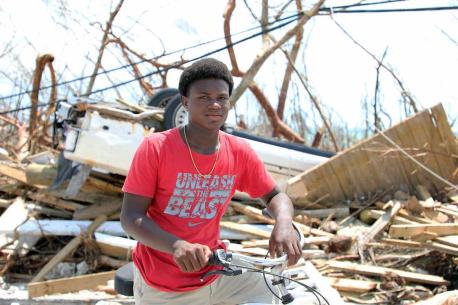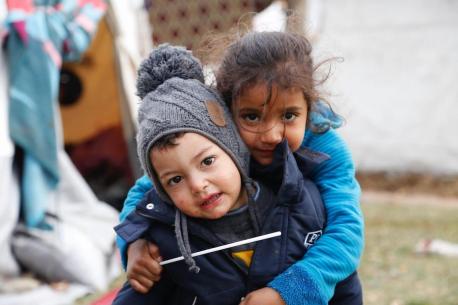
'Everything Is Destroyed': Dorian Survivors Face a Grueling Recovery
The clock is ticking for the 68,000 people who've lost their homes, loved ones and livelihoods. Here's how UNICEF and you can help.
First, the roof blew off the building in Marsh Harbour, Abaco, where Benson (above) sheltered for some 40 hours while Dorian pummeled the Bahamas. The 15-year-old and seven other members of his family remained in place with Dorian's Category 5 winds and torrential rain beating down on them. But after the windows broke and the walls collapsed, Benson and his family had no choice but to head out into the storm.
"We had to swim for our lives in dirty water, fighting against strong currents," says Benson. "Now everything is destroyed, every school. There is no water to drink."
We had to swim for our lives in dirty water, fighting against strong currents.
It's a wonder he's alive. Dorian's sustained 185 mph winds and rain inflicted unprecedented damage in the Bahamas. Nearly 70,000 people have been impacted, among them 18,000 children. While the official death toll is 50, it is expected to rise significantly as search and recovery operations continue.
In the storm's immediate aftermath, the names of people missing and those needing help grew by the hour. NBC News reported that a missing-persons Facebook page had 11,000 members and counting; a Google document serving a similar purpose stretched to almost 50 pages long.

On September 6, Benson, 15, took UNICEF Regional Communication Specialist Manuel Moreno Gonzalez on a tour of Marsh Harbour, one of the many neighborhoods on Abaco Island Dorian leveled. It is not uncommon to find cars like the one above, even boats, "hanging in trees," reports Moreno Gonzalez.
But of all places pummeled by Dorian, Benson's home, Abaco Island, was the most devastated.
Schools and hospitals are flattened; houses and roads have collapsed; cars and boats are hanging in trees.
On Friday, Sept. 6, Regional Communication Specialist Manuel Moreno Gonzalez toured Abaco as part of the UNICEF assessment team working on the Dorian response. Here is what he found:
In and around Marsh Harbour on Abaco Island, our team witnessed widespread devastation and destruction. Schools and hospitals are flattened; houses and roads have collapsed; cars and boats are hanging in trees.
Children and their families who survived the hurricane have lost their homes, their relatives, their livelihoods and have been left with little water and food. More than three days after the hurricane struck, families urgently need safe drinking water. Across the Bahamas, over 18,000 children are estimated to have been exposed to the impact of the hurricane.
Infrastructure in some parts of Abaco has been severely damaged or destroyed, which presents serious logistical challenges and hampers humanitarian access.
Aerial reconnaissance of Grand Bahama revealed that the airport runway and seaport seemed in good condition. But approximately 90 percent of buildings appeared to be severely affected, and the island was out of power. In Great Abaco, the international airport runway was partially submerged, and the control tower damaged. Drinking water was in short supply.

On 6 September 2019, Katheleh, 4, and her mother, Marianise, were evacuated from Marsh Harbour on Abaco Island to Nassau, Bahamas. Their home was destroyed by Hurricane Dorian, which slammed Abaco Island for 40 hours. Everything they had left fit in a few small bags.
Although there are no official estimates of the number of displaced, 5,500 people who evacuated from Abaco and Grand Bahama have registered in Nassau. An estimated 1,600 are living in shelters, many with little more than the clothes on their backs.
Katheleh, 4, her 11-year-old brother, Jahmaurae Moreau, and their mother were among the Marsh Harbour evacuees. Like Benson, they, too, saw their home destroyed, and with little food or water on the island, they boarded a helicopter bound for Nassau.
"This is what we have left," said Marianise pointing at a few handbags, "We have nothing else."
In support of the Government and UN partner agencies, UNICEF is now working around the clock to distribute lifesaving supplies to families in need.
- When hurricanes strike with such force, flooding inflicts damage upon water and sanitation systems. To protect residents from the diseases and related risks that arise, UNICEF has sent water and sanitation and hygiene supplies to the area. Supplies include water tanks that can serve up to 1,920 people daily along with water purification tablets and containers families can use to store safe drinking water.
- UNICEF is working with the Bahamas Ministry of Education to register approximately 10,000 displaced students in schools that were spared Dorian's damage. Registered displaced students will receive medical screenings, uniform and lunch assistance, referrals for counseling services and for social, sporting and extra-curricular activities, with free bus transportation where needed.
- With the Ministry of Education, UNICEF will start a training series to help school counselors, teachers and social workers give children the psychological and emotional support they need to heal from the trauma they've experienced and witnessed.
- UNICEF is serving as a resource to help Bahamian authorities ensure that the nutritional needs of infants, young children and their mothers and caregivers don't suffer.
UNICEF is urgently seeking $4 million for its emergency response to help children and families. Moreno Gonzalez warns there's no time to lose:
"The clock is ticking for them to receive lifesaving assistance."
Top photo: Benson was with his family in a two-story building in Marsh Harbour on Abaco when Hurricane Dorian slammed his Island community for 40 hours. On September 6, the 15-year-old rode his bicycle around town to see what had become of his home. "Everything is destroyed, every school," he says. "There is no water to drink." All photos: © Manuel Moreno Gonzalez for UNICEF
HOW TO HELP
There are many ways to make a difference
War, famine, poverty, natural disasters — threats to the world's children keep coming. But UNICEF won't stop working to keep children healthy and safe.
UNICEF works in over 190 countries and territories — more places than any other children's organization. UNICEF has the world's largest humanitarian warehouse and, when disaster strikes, can get supplies almost anywhere within 72 hours. Constantly innovating, always advocating for a better world for children, UNICEF works to ensure that every child can grow up healthy, educated, protected and respected.
Would you like to help give all children the opportunity to reach their full potential? There are many ways to get involved.





